On the Move: 50 Years of Title IX
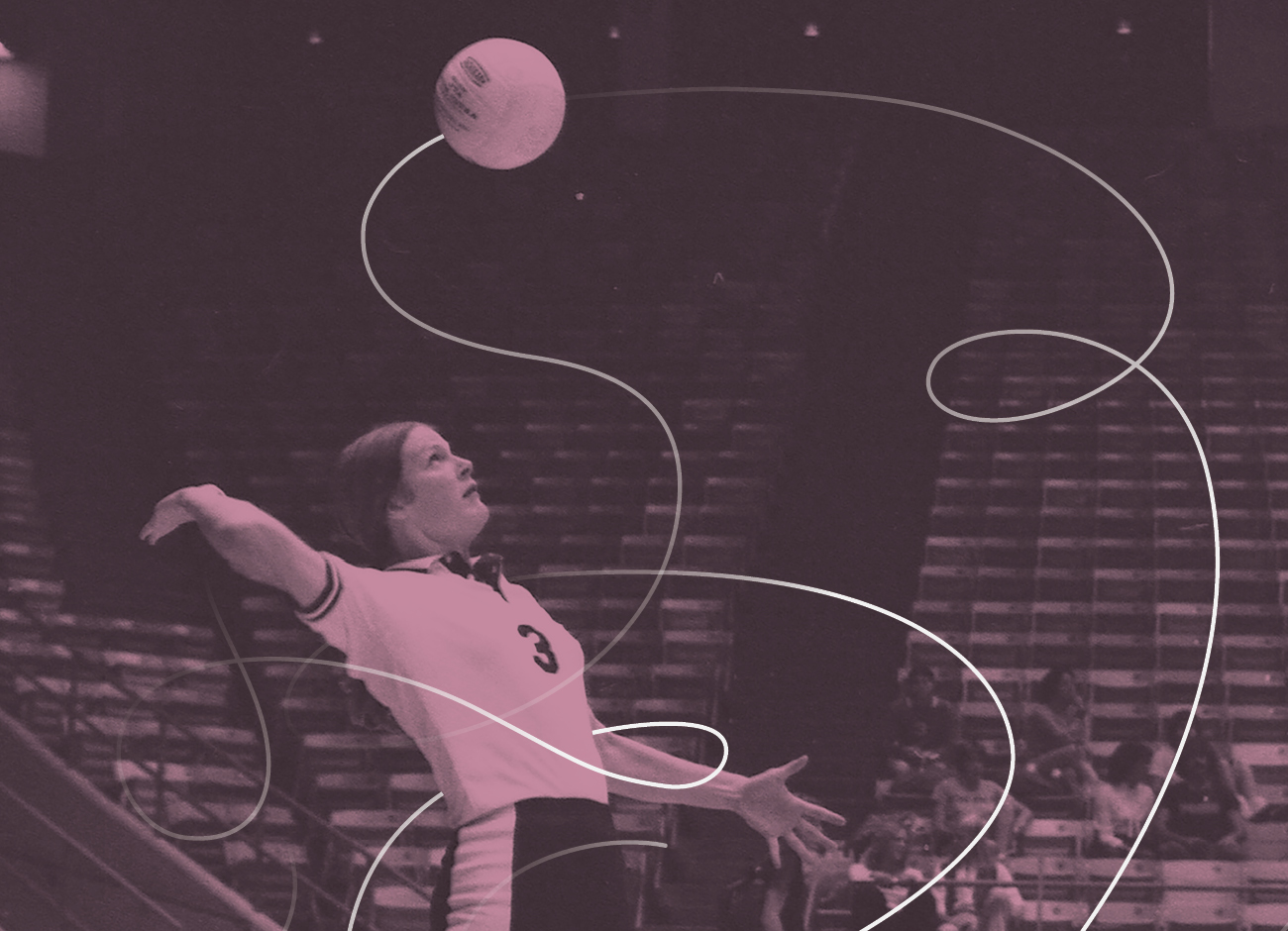
It was the late ‘70s. So, it certainly wasn’t the first time someone in Utah had hooked up a camping trailer to a pickup, thrown some food, sleeping bags, and young people in the back and headed south for California.
But Marilyn Weiss wasn’t exactly Clark Griswold. And the trip from Cache Valley to Los Angeles wasn’t a vacation.
At the time, Weiss was the women’s athletic director at Utah State University, and her traveling companions were the coaches and players on the Aggie volleyball team. And in order to compete against some of the top teams in the country like UCLA and USC at spring volleyball tournaments, it meant getting to the West Coast by any means possible. And as cheaply as possible.
“All the competition was in Southern California, so we would load up in a fifth-wheel trailer, and we would drive down and stop in Vegas for the $1.99 breakfast, all-you-can-eat breakfast buffet,” former Utah State middle blocker Gayle Adamowicz recalled in an interview last year with Megan Carter and Derek Van Weerd, students in History 3005 — Sport: A Global History, a class taught in the spring of 2022 by history professor Tammy Proctor.
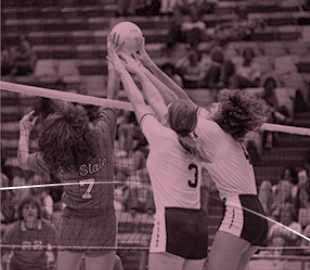
“Then we would go compete and play and train in our offseason in Southern California. We all slept in the fifth-wheel trailer. I don’t know how we did it. Some people had the bed, two people slept on either side of the bed …. Pulled up the table, two more people slept there. It was (crazy). I mean, it was fun, because you were young, but that’s how we traveled, and that’s how we got more court time in against better competition.”
“That’s probably not even legal now,” Weiss noted in another interview with Proctor.
But ultimately, Weiss’ considerable efforts on a shoestring budget paid off, with the USU volleyball team winning the Association for Intercollegiate Athletics for Women (AIAW) national championship in 1978 and second place in ’79. Weiss also helped build the Aggie women’s softball program, which won the AIAW national title in both 1980 and ’81.
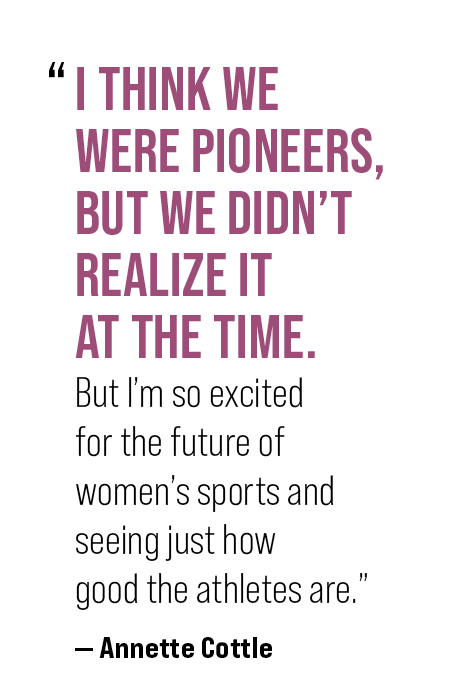
Those three women’s championships mark the only national titles — in both men’s and women’s team sports — in Utah State history. But despite that success, Weiss, who was hired in 1975 to the women’s basketball, volleyball, and track coaches, as well as the women’s AD, was gone by 1981. She took the same position at Florida, which was blessed with a budget $1 million more than that of USU women’s athletics.
But a few years before she left Logan, Weiss filed a Title IX complaint against the university, which was investigated by the Office of Civil Rights. Enacted in 1972, Title IX of the Education Amendments Act created a federal law decreeing that “No person in the United States shall, on the basis of sex, be excluded from participation in, be denied the benefits of, or be subjected to discrimination under any education program or activity receiving federal financial assistance.” As far as collegiate athletics, that meant that women’s programs should be on par with that of men’s programs in areas like facilities, equipment, practice time, and the number of scholarships and team opportunities available.
In Weiss’ eyes, “not much had been done at USU” between 1972 and her arrival in ’75, but she made due with the limited options she had, like 10 in-state and one out-of-state scholarship for all the women’s programs combined. But after successfully bringing in well-known former Olympians Mary Jo Peppler and Marilyn McReavy (Nolen) to kickstart the Aggie volleyball program, Weiss wanted to keep the program at a national level, something that would take additional scholarships and more money.
“I just felt like in ’78 that, yeah we had accomplished a lot, but we still were not getting the support that I felt like we should have,” Weiss stated. “I knew it was going to take something to jolt them. And I don’t think they ever thought that, you know, I would file a Title IX complaint. And in so doing it, I thought well, you know, it’s not going to help me, but it’ll help the student-athletes down the road.”
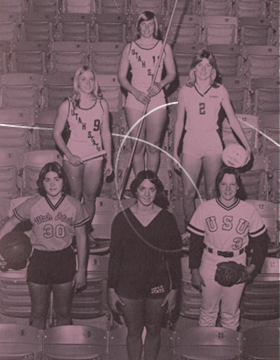
It was that kind of resolve that sparked Proctor’s interest in developing a class based around Weiss’ efforts and considerable success of the USU volleyball team in 1978 and ’79. The nine students in the class chose to research the Aggie volleyball teams of 1978 and ’79 using the backdrop of the 50th anniversary of Title IX.
“After I finished as department head in 2021, it gave me an opportunity to teach a little more and offer some new things,” Proctor explains. “And I decided I wanted to do a sports history class that deals with some of the global issues, but that also had a component that got the students to do some more community engagement. It’s hands-on kind of stuff to help build the history of the sport here at USU.”
Working in conjunction with Kelly Rovegno, university archivist in USU’s Special Collections & Archives, the pair set out to not only start a new class, but also create a USU women’s athletics archives and “tell some of the stories that haven’t really been featured much in the past.” The students, who also produced a YouTube video entitled “Playing with Title IX: USU Women’s Volleyball 1978-80,” interviewed Weiss and several players from that period, while collecting photographs, game programs, and official university correspondence.
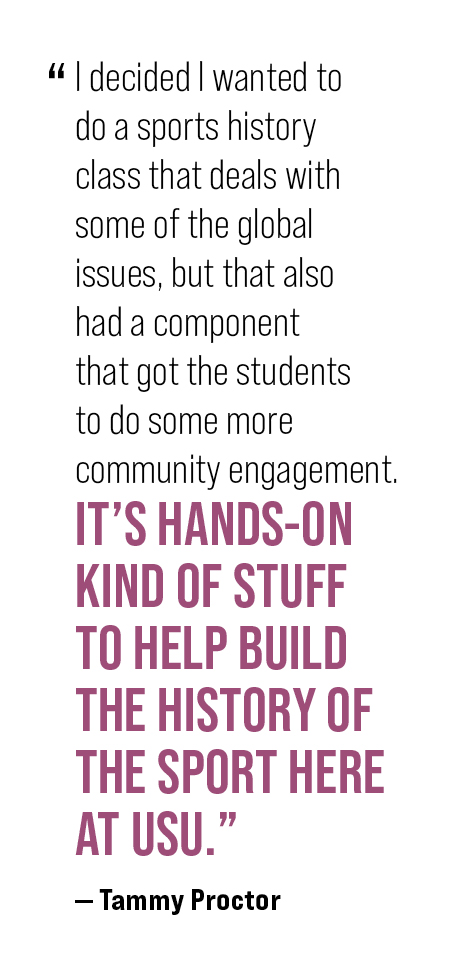
“The work we did with Dr. Proctor’s class allowed students to engage with our existing collections material and gave them the unique opportunity to collect and preserve materials themselves,” Rovegno says. “One of the goals of University Archives is to capture the broad spectrum of experiences at USU. The oral histories conducted by the students are a great way to share the voices of the women athletes and coaches and make sure their stories are preserved for the future.”
A digital exhibit featuring the material curated by the class went live in January, just about the same time it was announced that Weiss would be inducted into Utah State Athletics Hall of Fame as part of an all-female class composed in honor of the 50th anniversary of Title IX.
Clearly, Weiss’ tenure at USU is viewed differently today than it was in the 1970s and early ‘80s. When she was hired to replace Fern Gardner, another USU hall of famer, Weiss was working at the K-12 laboratory school at the University of Northern Colorado. And yet she was able to convince Peppler and McReavy, who were playing professional volleyball in Houston at the time, to come to Logan, Utah.
The hiring of that renowned duo helped recruiting immensely. Annette Cottle, a Salt Lake City native who played her freshman and sophomore seasons for a very good BYU program, played some club volleyball for Peppler and McReavy during the summer and soon decided to transfer to Utah State.
“It was pretty controversial, I have to be honest,” admits Cottle, who went on to coach the USU program herself from 1982-84. “But I had a good feeling, and my goal was to be the best player I could be. And the team was a great group of gals. We just all clicked.”
Before the AIAW gave way to the NCAA in the early ‘80s, female athletes could transfer schools without having to sit out a year. However, they were unable to hold a scholarship that first year after transferring, which meant that the best player on the best volleyball team in 1978 played without the benefit of a scholarship. To get by, Cottle took a job buying food each week for residents of the large house inhabited by female athletes of all sports who, unlike the male athletes at the time, did not have the benefit of access to a training table — meals provided to athletes by an institution.
Female athletes also had to do things like wash their own uniforms, and the Aggie volleyball team never had a trainer travel with them. One player was even referred to a chiropractor for a torn anterior cruciate ligament in her knee before her parents stepped in and paid for her surgery.
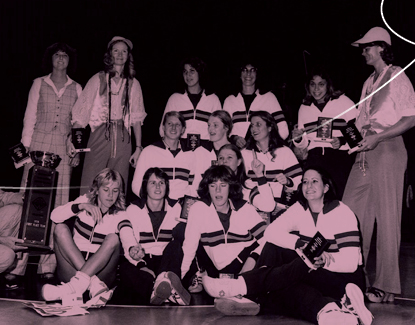
“I think the women had like 11 scholarships, while the men had 125,” Cottle notes. “But Marilyn Weiss wasn’t afraid to push some things and maybe get enough money to fly us somewhere or put two of us in a hotel room instead of five. I know it was a real struggle for her, but she was determined to give us that opportunity.”
The ultimate opportunity came on Dec. 9, 1978, in Tuscaloosa, Alabama, when the Aggies downed mighty UCLA, 3-1, to secure a 48-4-2 record and the first team national championship in school history. In addition, Cottle was later recognized as the winner of the Broderick Award as the top volleyball player in the nation.
“It’s basically a big silver bowl, so I thought, How fun would it be to put cereal in it and eat out of it?” Cottle says with a laugh. “So, I did. But then my mom said, ‘You don’t do that,’ and quickly cleaned it up and put it back on its little stand.”
While that might have been a training table experience that even the male athletes didn’t get, the “fight” certainly wasn’t over for Cottle and female athletes like her as far as equity under Title IX.
“I see the fight still going on,” says Cottle, who now lives in Hawaii and Nevada after a long career with the Ogden Parks Department. “I think we were pioneers, but we didn’t realize it at the time. But I’m so excited for the future of women’s sports and seeing just how good the athletes are is exciting to me.”
Amy (Goulding) Crosbie, who played volleyball for the Aggies from 1997-2001, now sits in Weiss’ seat as the women’s athletic director at Utah State. Things have certainly changed in the past 40-45 years as far as women’s athletics, primarily positive changes that she’s witnessed both as an athlete and an administrator (see sidebar). Also involved with Proctor’s class project, Crosbie says she’s had her eyes opened even further despite being involved with Title IX issues on a daily basis.
“I’m certainly grateful for the people that noticed the inequities and fought and kind of broke through that initial ceiling,” she declares. “So, there’s been a lot to celebrate with the 50th anniversary of Title IX. But I also think it’s been a good time to reflect and think about what we want the next 50 years to look like.
“How do we want to be a part of that transformational change? I think athletes today are more invested in what that should look like, and I think that’s awesome that they’re noticing big or small inequities and tackling them head on.”




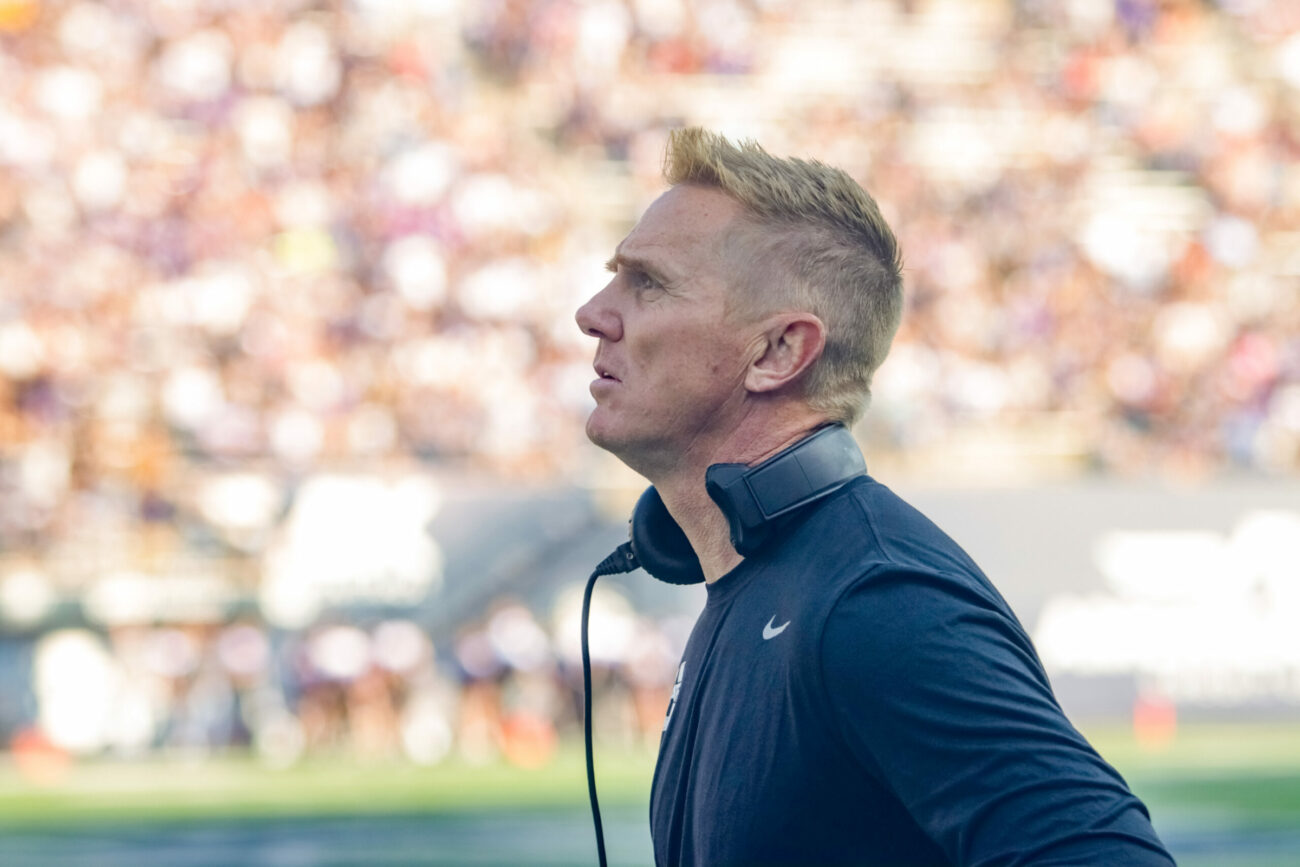


Carolyn March 15, 2023
Too bad your focus begins with the late seventies and not on earlier seventies. In 1972 USU women basketball team went to Normal, Illinois to participate in the first AIAW (now NCAA) national tournament. Transportation to most softball games was not by bus or air but by automobile.